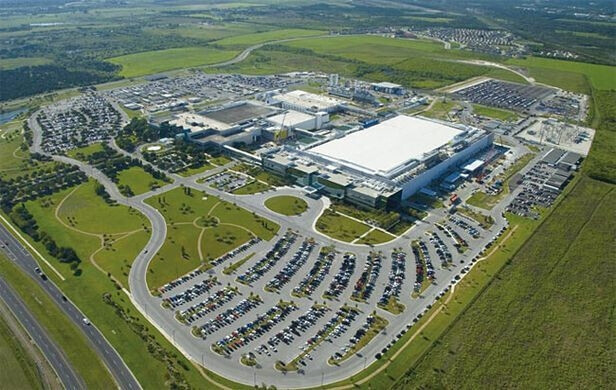hankyoreh
Links to other country sites 다른 나라 사이트 링크
Global semiconductor supply chain to see major reshuffle around 2025, S. Korean report suggests

The global semiconductor supply chain will undergo reshuffling and see intensifying market competition around 2025, according to an analysis based on the investment plans of major semiconductor companies and anticipated support for the industry by governments around the world.
Kim Yang-paeng, a senior researcher in the ICT & Emergent Industry Division at the Korea Institute for Industrial Economics & Trade (KIET), wrote in a report published Sunday titled “Anticipated Reshuffling of the Global Semiconductor Supply Chain and Its Implications” that 2025 would be a turning point in the reshuffling of the global semiconductor supply chain.
Kim pointed out that “major countries actively pursuing policies and measures that would support the semiconductor industry forewarns a shift in the global supply chain,” adding that “global chip companies like Intel and TSMC are strengthening the foundation they have for manufacturing in their own countries or countries like India, Germany, and Japan, leading to views that foundry competition will intensify.”
Noting that multiple semiconductor factories had broken ground this year, Kim explained that “as factory construction takes about one to two years, and yield stabilization takes about another year, [those plants] would finish construction around 2025.” He pointed to the investment plans of Intel, TSMC, and Samsung Electronics as his representative cases.
After announcing last September that it would invest US$95 billion over the next 10 years to construct a new plant in Germany, in March, Intel chose the city of Magdeburg in central Germany as the site for its factory. Construction is expected to begin there soon.
The semiconductor foundry Samsung Electronics said it would build in the US is also slated to begin construction this year. Last June, the South Korean company announced its plan to spend US$17 billion to establish a new foundry in Taylor, Texas, construction for which is set to begin this year, after which the plant will be put into operation in 2024.
Taiwanese heavyweight TSMC is also planning to build a manufacturing plant for semiconductors ranging in size from 22 to 28 nanometers in Kumamoto Prefecture, in southern Japan. After construction for the factory begins this year, the company will start mass-producing chips at the plant starting in 2024. Since November of last year, it has been negotiating with the local government in New Delhi, India, to erect a semiconductor plant worth US$7.5 billion in the city.
China’s plan to cultivate its semiconductor industry also coincidentally pivots around 2025, but this won’t be a significant variable in the reshuffling of the global supply chain, according to Kim’s analysis.
“China’s self-sufficiency rate for chips has lingered at 16% and doesn’t have much room to grow,” Kim wrote, the explanation for which is that the country is not in a position to import advanced equipment due to its competition with the US.
Therefore, there “won’t be much room for China” in the competition that would arise when the supply chain reshuffles, Kim argued. In its “Made in China 2025” plan that was released in 2015, China had declared that it would raise its semiconductor self-sufficiency rate to 70% by 2030.
In its report, the KIET predicted that “though [South Korea] has been able to maintain its neutrality between the US and China and advance its semiconductor industry up until now because no other country could manufacture memory semiconductors, it would find it difficult to keep up its ambiguously neutral position once the semiconductor supply chain is reshuffled.”
The institute added that “in order for [it] to establish [itself] as a hub within the reshuffled global semiconductor supply chain, [South Korea] should consider participating in the US-led ‘chip alliance’ with optimism.”
By Kim Young-bae, senior staff writer
Please direct questions or comments to [english@hani.co.kr]

Editorial・opinion
![[Guest essay] Maybe Korea’s rapid population decline is an opportunity, not a crisis [Guest essay] Maybe Korea’s rapid population decline is an opportunity, not a crisis](https://flexible.img.hani.co.kr/flexible/normal/500/300/imgdb/original/2024/0430/9417144634983596.jpg) [Guest essay] Maybe Korea’s rapid population decline is an opportunity, not a crisis
[Guest essay] Maybe Korea’s rapid population decline is an opportunity, not a crisis![[Column] Can Yoon steer diplomacy with Russia, China back on track? [Column] Can Yoon steer diplomacy with Russia, China back on track?](https://flexible.img.hani.co.kr/flexible/normal/500/300/imgdb/original/2024/0430/1617144616798244.jpg) [Column] Can Yoon steer diplomacy with Russia, China back on track?
[Column] Can Yoon steer diplomacy with Russia, China back on track?- [Column] Season 2 of special prosecutor probe may be coming to Korea soon
- [Column] Park Geun-hye déjà vu in Yoon Suk-yeol
- [Editorial] New weight of N. Korea’s nuclear threats makes dialogue all the more urgent
- [Guest essay] The real reason Korea’s new right wants to dub Rhee a founding father
- [Column] ‘Choson’: Is it time we start referring to N. Korea in its own terms?
- [Editorial] Japan’s rewriting of history with Korea has gone too far
- [Column] The president’s questionable capacity for dialogue
- [Column] Are chaebol firms just pizza pies for families to divvy up as they please?
Most viewed articles
- 1Dermatology, plastic surgery drove record medical tourism to Korea in 2023
- 2[Guest essay] Maybe Korea’s rapid population decline is an opportunity, not a crisis
- 3Months and months of overdue wages are pushing migrant workers in Korea into debt
- 4Under conservative chief, Korea’s TRC brands teenage wartime massacre victims as traitors
- 5First meeting between Yoon, Lee in 2 years ends without compromise or agreement
- 6[Column] Can Yoon steer diplomacy with Russia, China back on track?
- 7[Editorial] Japan’s rewriting of history with Korea has gone too far
- 8[Editorial] When the choice is kids or career, Korea will never overcome birth rate woes
- 9[Column] Why Korea’s hard right is fated to lose
- 10Korean research team finds potential link between nanoplastics, obesity